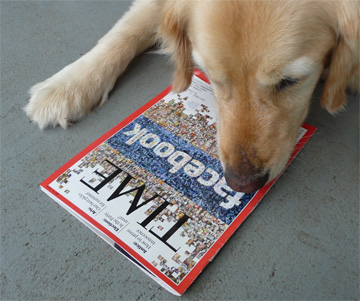Remember MySpace? It was all the rage just a few years ago. In 2006 it became the most visited website in the U.S. You just had to have a MySpace, especially if you were under 25.
But then something happened. Facebook happened. It skyrocketed to the top of the social media ladder, while MySpace plummeted, now down to 186th place in the online world.
 So has Facebook secured its place on the top of the ladder? Not necessarily, says journalist Michael Wolff, writing in USA Today. According to Wolff, Facebook is on the road to becoming the next MySpace. He explains:
So has Facebook secured its place on the top of the ladder? Not necessarily, says journalist Michael Wolff, writing in USA Today. According to Wolff, Facebook is on the road to becoming the next MySpace. He explains:
Not only is Facebook challenged by its inability to grow advertising revenue fast enough — the primary culprit in its 50% share-price plunge — but now it’s facing a carve-up of the social experience.
This is not just by the high-fliers in its space, Twitter and Linkedin — themselves in danger of fragmentation — but by an ever-growing assortment of specialty players.
This is happening by demographics: Path, for instance, targets an upscale, executive, familyish, yuppified niche. It’s happening by interest: ArtStack focuses on art and taste as the common thread. There’s gender: Luluvise and SkinnyScoop. There’s format: Pinterest. There’s video and audio: Viddy and Just Sayin’.
If you’re not familiar with these alternative social networking sites, as I was not before reading Wolff’s article, I refer you to his helpful explanation. But here’s something worth thinking about . . . and quoting:
Facebook is cookie-cutter-ish. Facebook is boring.
Facebook verges on the totally square.
It’s something to rise above — to aspire out of.
Facebook is … MySpace.
Wolff concludes:
Facebook has built a platform that allows other people to start more intimate, personalized, targeted networks. But that facilitation isn’t Facebook’s business, at least, it’s not the one they envisioned. . . .
Facebook’s flaw is that it has always thought of itself as a data company. By facilitating a set of orderly interactions, it would garner exclusive information that would give it valuable insight into people’s behavior. It would eventually know so much about you that it would be able to tell you, with ever-increasing certainty, who should be your friends.
Perhaps never has there been a lamer misunderstanding of social interaction. Or maybe it’s the classic nerd misunderstanding: that you can learn social ease and nuance.
I’m mostly a casual observer of social media phenomena. And I’m surely no accurate forecaster of the future of social media. But, given what we’ve seen in the past, with MySpace and other platforms for digital interaction, it does seem that the spot at the top of the ladder is precarious. Moreover, it does seem likely that people will begin to look for more intimate and familiar ways to interact online. Even folks who love a big city live in small neighborhoods they call home.












